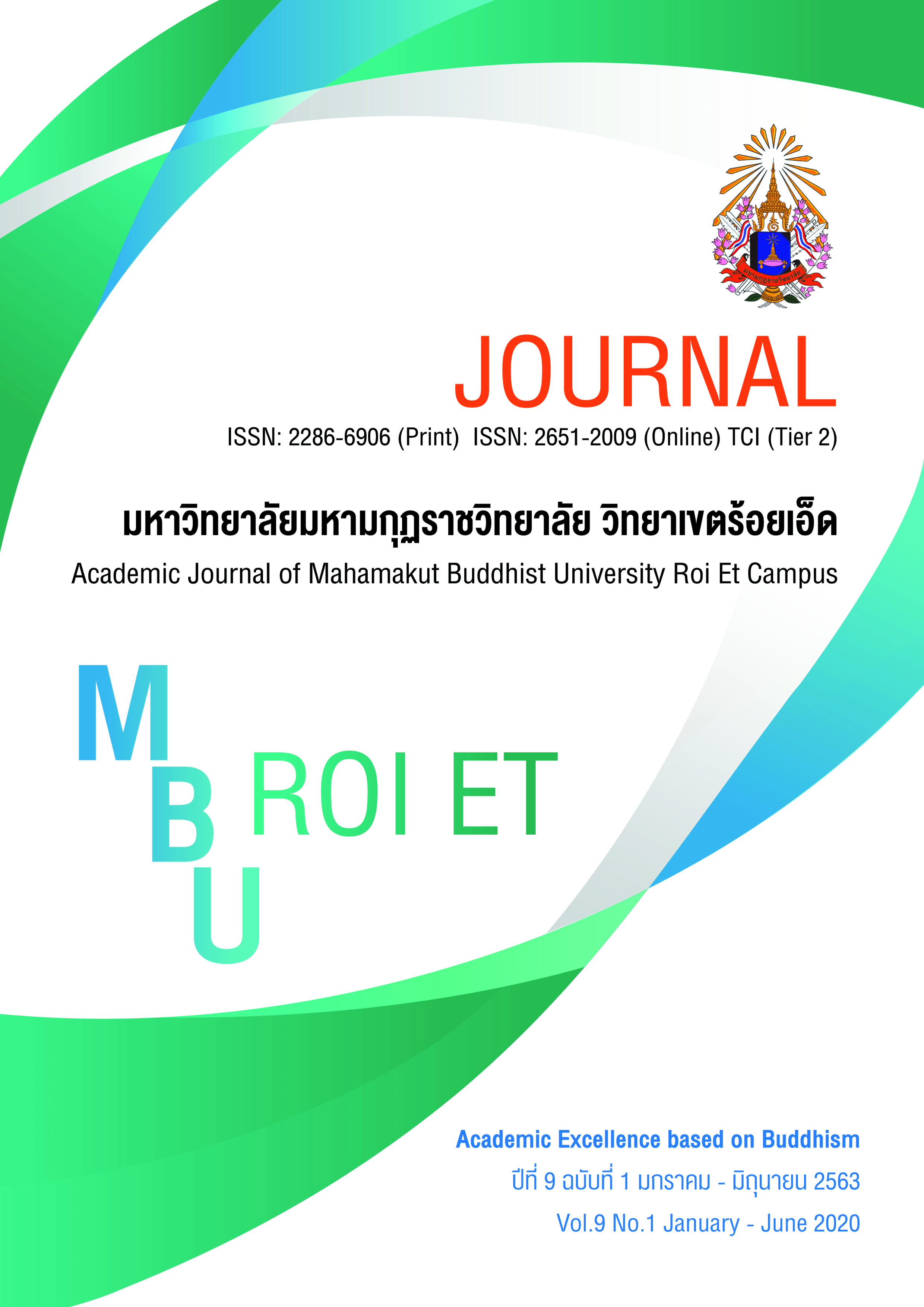Academic Leadership of Administrators Affecting Effectiveness of Educational Institutions under KhonKaen Vocational Education
Main Article Content
Abstract
The Objectives of the research article were to 1) study the academic leadership of administrators and the effectiveness of educational institutions. 2) study the relationship between academic leadership of administrators affecting the effectiveness of educational institutions. 3) study the academic leadership predictors of administrators that affect the effectiveness of educational institutions under KhonKaen vocational education. The sample group used in this study included educational institution administrators and teachers under KhonKaen vocational education with the total number of 277 persons. The instrument was a 5 level rating scale questionnaire with accuracy coefficient at 0.90. The statistics used were frequency, percentage, mean, standard deviation, Pearson's Product Moment Correlation Coefficient and Stepwise Multiple Regression Coefficient.
The research results were found that: (1) Academic leadership of educational institution administrators under KhonKaen vocational education in overall and each aspect was rated at a high level. The aspect with the highest mean was academic atmosphere promotion, followed by determining the mission of educational institutions, while the aspect with the lowest mean was teaching management and the effectiveness of educational institution administrators under KhonKaen vocational education in overall and each aspect was rated at a high level. The aspect with the highest mean was problem solving ability in educational institutions, followed by the high academic achievement of students, while the aspect with the lowest mean was adjustment ability and educational institution development.(2)The relationship between academic leadership of administrators and the effectiveness of educational institution administrators under KhonKaen vocational education was found that correlation coefficient between academic leadership of administrators and effectiveness of educational institutions under KhonKaen vocational education in all aspects has a positive relationship. When considering the correlation coefficient in each aspect, it was found that the aspect of atmosphere promotion, learning culture determining the mission of educational institutions and teaching and learning management and innovation technology has relationship at a moderate level with statistical significance at the level of .01. (3) Regarding to academic leadership of administrators affecting the effectiveness of educational institutions under KhonKaen vocational education, the results of multiple regression analysis showed that there were 2 tested variables have a statistically significant relationship at the level of .01, namely promoting atmosphere and learning culture (X3), followed by determining missionof educational institutions (X1) respectively and have a multiple correlation coefficient at .632 with statistical significance at the level of .01 with a prediction coefficient or predictive power = 40 percent (R2 = 0.40).
Article Details
References
จริยาภรณ์ พรหมมิ. (2559). ปัจจัยภาวะผู้นำทางวิชาการของผู้บริหารสถานศึกษาที่ส่งผลต่อประสิทธิผลของโรงเรียนสังกัดสำนักงานเขตพื้นที่การศึกษาประถมศึกษาสุพรรณบุรี เขต 3.วิทยานิพนธ์ศึกษาศาสตรมหาบัณฑิต สาขาวิชาการบริหารการศึกษา. มหาวิทยาลัยบูรพา.
จิรวัฒน์ วรุณโรจน์.(2559). ศึกษาความสัมพันธ์ระหว่างภาวะผู้นำการเปลี่ยนแปลงของผู้บริหารกับความพึงพอใจในการปฏิบัติงานของบุคลากรในสถาบันอุดมศึกษาเอกชน เขตภาคตะวันออกเฉียงเหนือ. วารสารศึกษาศาสตร์ฉบับวิจัยบัณฑิตศึกษา มหาวิทยาลัยขอนแก่น. 10(4). 26-33.
จุฑามณี อาสนสุวรรณ. (2562). ภาวะผู้นำทางวิชาการของผู้บริหารสถานศึกษาที่ส่งผลต่อประสิทธิผลของสถานศึกษา สังกัดองค์การบริหารส่วนจังหวัดชัยภูมิ. วิทยานิพนธ์ศึกษาศาสตรมหาบัณฑิต สาขาวิชาการบริหารการศึกษา. มหาวิทยาลัยภาคตะวันออกเฉียงเหนือ.
นิยดา เปี่ยมพืชนะ. (2561). ศึกษาโมเดลปัจจัยเชิงสาเหตุที่มีอิทธิพลต่อการเสริมสร้างพลังอำนาจการทำงานที่มีประสิทธิภาพของอาจารย์ในสถาบันอุดมศึกษาเอกชนในภาคตะวันออกเฉียงเหนือ. วารสารมหาวิทยาลัยราชภัฏธนบุรี. 12(2). 154-165.
ประยูร คุณนาม. (2557). ความสัมพันธ์ระหว่างการบริหารงานวิชาการของผู้บริหารสถานศึกษากับประสิทธิผลของสถานศึกษาในอำเภอบ่อทองสำนักงานเขตพื้นที่การศึกษาประถมศึกษาชลบุรีเขต 2. ปริญญานิพนธ์การศึกษามหาบัณฑิต สาขาวิชาการบริหารการศึกษา. บัณฑิตวิทยาลัย : มหาวิทยาลัยบูรพา.
ไพฑูรย์ บุญปัน. (2559). ภาวะผู้นำทางวิชาการของผู้บริหารสถานศึกษา สังกัดสำนักงานเขตพื้นที่การศึกษาประถมศึกษาสระแก้ว เขต 2.วิทยานิพนธ์ครุศาสตรมหาบัณฑิต สาขาวิชาการบริหารการศึกษา. มหาวิทยาลัยราชภัฏบุรีรัมย์.
พิทักษ์พงศ์ กางการ. (2560). การสร้างสมรรถนะ การเป็นผู้นำ. ขอนแก่น : มหาวิทยาลัยขอนแก่น.
สถาบันทดสอบการศึกษาแห่งชาติ. (2561). รายงานผลการทดสอบทางการศึกษาระดับชาติด้านอาชีวศึกษา V-net (Vocational National Educational Test : V-NET) ประจำปี 2561. สืบค้นเมื่อ 3 กันยายน 2562. จาก https://www.niets.or.th/th/
สำนักงานคณะกรรมการการอาชีวศึกษา. (2560). แผนพัฒนาการอาชีวศึกษา พ. ศ. 2560-2579. กรุงเทพมหานคร : สำนักงานคณะกรรมการการอาชีวศึกษา.
Taro Yamane. (1973). Statistics: an introductory analysis. Third edition. Newyork: Harper and Row Publication.


